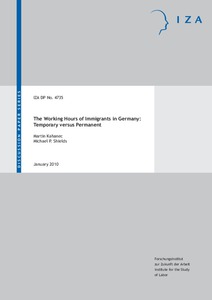The working hours of immigrants in Germany: temporary versus permanent
"Migration is often viewed as an investment decision. Temporary migrants can be expected to invest less in accumulating human capital specific to the host country. Instead, they work more hours in order to accumulate savings and invest in financial capital that can be transferred back to their...
| Main Authors: | , |
|---|---|
| Institution: | ETUI-European Trade Union Institute |
| Format: | TEXT |
| Language: | English |
| Published: |
Bonn
2010
IZA |
| Subjects: | |
| Online Access: | https://www.labourline.org/KENTIKA-19186570124919047529-The-working-hours-of-immigrant.htm |
| Summary: | "Migration is often viewed as an investment decision. Temporary migrants can be expected to invest less in accumulating human capital specific to the host country. Instead, they work more hours in order to accumulate savings and invest in financial capital that can be transferred back to their country of origin upon return. In this paper, using German panel data, we explore how temporary migrants differ from permanent migrants in their labor supply decisions and behavior. Upon correcting for endogeneity bias, temporary migrants are found to work more hours than permanent ones. This result supports the human capital theory and a household production model of migration where migrants may be temporary by choice and not because of legal restrictions or even a bad experience in the labor market. " |
|---|---|
| Physical Description: | 30 p. Digital |

